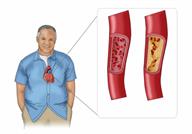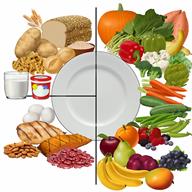Heart Attack
A heart attack happens when the flow of blood and oxygen to the heart is cut off. If not treated right away, a heart attack can cause lasting damage to the heart. A heart attack is also called a myocardial infarction.
If you think you're having a heart attack, don't wait to see if the symptoms will go away. Get medical help right away.
What are the causes?

A heart attack may be caused by:
A fatty substance called plaque. This can build up in blood vessels called arteries. It can block the flow of blood to the heart.
A blood clot in the blood vessels that go to the heart.
An abnormal heartbeat.
Some diseases that lower the amount of oxygen in the blood. These include anemia and emphysema.
Tightening of a blood vessel that cuts off blood to the heart. This is called a spasm.
Other causes may include:
What increases the risk?
-
Aging. The risk gets higher as you get older.
- Having a family history of or any past problems with:
-
Taking chemotherapy or medicines to treat cancer.
-
Being male.
-
Being overweight or obese.
- Having any of these conditions:
High blood pressure.
High cholesterol.
Diabetes.
- Doing any of these things:
What are the signs or symptoms?
Symptoms of a heart attack can vary, depending on things like your gender or age. Symptoms may include:
- Chest pain. It may feel like:
Pain in the arm, neck, jaw, back, or upper body.
Heartburn or upset stomach.
Shortness of breath.
Feeling like you may vomit.
Cold sweats.
Feeling light-headed or dizzy all of a sudden. Or you may pass out.
How is this diagnosed?
A heart attack may be diagnosed with:
How is this treated?

A heart attack must be treated as soon as possible. Treatment may include:
- Medicines to:
Break up or dissolve blood clots.
Help prevent blood clots.
Treat blood pressure.
Improve blood flow to the heart.
Help with pain.
Angioplasty and stent placement. These are procedures to widen a blocked artery and keep it open.
Open heart surgery, called coronary artery bypass grafting. This enables blood to flow to the heart by going around the blocked part of the artery.
Follow these instructions at home:
Medicines
Lifestyle

-
Do not smoke, vape, or use products with nicotine or tobacco in them. If you need help quitting, talk with your provider.
-
Avoid secondhand smoke.
- Exercise often. Ask your provider about a cardiac rehab program. This program helps you to:
-
Eat foods that are healthy for your heart. Your provider will tell you what foods to eat.
-
Stay at a healthy weight.
-
Learn ways to lower your stress level.
-
Do not use illegal drugs.
Alcohol use
-
Do not drink alcohol if:
Your provider tells you not to drink.
You're pregnant, may be pregnant, or plan to become pregnant.
- If you drink alcohol:
- Limit how much you have to:
Know how much alcohol is in your drink. In the U.S., one drink is one 12 oz bottle of beer (355 mL), one 5 oz glass of wine (148 mL), or one 1½ oz glass of hard liquor (44 mL).
General instructions
-
Work with your provider to treat other problems you have, such as high blood pressure or diabetes.
-
Get screened for depression. Get treatment if needed.
-
Keep your vaccines up to date. Get the flu shot every year.
-
Keep all follow-up visits. Your provider will check that your heart health is improving with treatments.
Contact a health care provider if:
-
You feel very sad.
-
You have trouble doing your daily activities.
-
You get light-headed or dizzy.
-
You have blood pressure that is higher or lower than what your provider told you it should be.
-
You have sudden, unexplained discomfort in your chest, arms, back, neck, jaw, or upper body.
-
You have sudden shortness of breath.
-
You have sudden sweating or your skin is cold to the touch.
-
You feel like you may vomit or you vomit.
-
You feel your heart beating fast or skipping beats.
These symptoms may be an emergency. Call 911 right away.
This information is not intended to replace advice given to you by your health care provider. Make sure you discuss any questions you have with your health care provider.
 A heart attack may be caused by:
A heart attack may be caused by: A heart attack must be treated as soon as possible. Treatment may include:
A heart attack must be treated as soon as possible. Treatment may include: